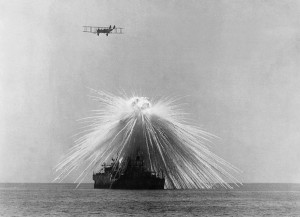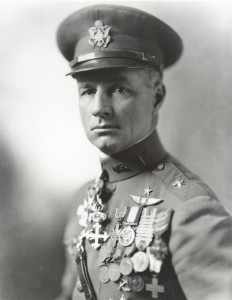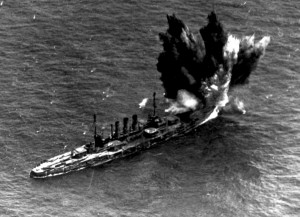Published on July 21, 2012
On this day in aviation history in 1921, off the Virginia Capes, a flight of US Army Air Service Martin NBS-1 bombers flew over and dropped bombs on the Ostfriesland, a decommissioned German battleship from World War I. At the time, the potential of air power was ridiculed and it took a man with the personal commitment and vision of General William “Billy” Mitchell to overcome the obstacles and successfully hold a test.
His detractors were fierce. The Secretary of War, the Honorable Newton Baker, would quip about Mitchell’s proposal to bomb ships from the air, “That idea is so damned nonsensical and impossible that I’m willing to stand on the bridge of a battleship while that nitwit tries to hit it from the air.” Likewise, the Secretary of the Navy, the Honorable Josephus Daniels, would issue the ultimate denigration of Mitchell’s vision of the potential of air power with the words, “Good God! This man should be writing dime novels.”
Yet Mitchell got his tests approved and proceeded to demonstrate just what his little “crates” could do. Indeed, to not hold the tests would prove the farce of the Navy’s positions — if the battleships were so invincible, then a test should be no risk at all. General Billy Mitchell knew full well that he was laying his career down in the bet that he was right.
On July 21, 1921, despite bizarre restrictions on the number of bombs to be dropped, the size of the bombs and delays between each bomb for “inspection purposes,” Mitchell’s little airplanes came through. As US Navy officers watched, the dream of the supremacy of capital ships sank before their eyes. Yet the nightmare of the admirals was the positive realization of the dream of William “Billy” Mitchell.
Despite the test’s success, however, Billy Mitchell was unable to achieve victory in the greater battle at hand concerning the future of the budget. While Mitchell saw with clarity that the defense of America would be dependent on air power, the Navy continued to see it differently. They argued that had the ships been underway and manned with damage control teams, the results would have been different. In the end, the sinking of the Ostfriesland instead hastened General Mitchell’s political and personal demise. His subsequent joust with the leadership of the Army and Navy resulted in him being subjected to court martial and stripped of his General officer rank. He was reduced to the rank of Colonel. Ultimately, he would resign from the Army in 1926, but would never stop preaching about the potential of air power.

Mitchell’s followers never let his vision die. His writings would continue to find new proponents and new audiences. The power of Mitchell’s voice still rings true today:
Nothing can stop the attack of aircraft except other aircraft.
The most important branch of aviation is pursuit, which fights for and gains control of the air.
The advent of air power, which can go straight to the vital centers and either neutralize or destroy them, has put a completely new complexion on the old system of making war. It is now realized that the hostile main army in the field is a false objective, and the real objectives are the vital centers.
In the development of air power, one has to look ahead and not backward and figure out what is going to happen, not too much what has happened.
Colonel Billy Mitchell did not live to see the end of the battleship’s grip on the budget. He passed away in 1936 at just 56 years old. Yet in spectacular fashion, Mitchell’s vision of air power was played out large at Pearl Harbor on December 7, 1941. The “day that will live in infamy” had become the graveyard not just of thousands of American sailors and dozens of ships, but also of the strategic argument against the potential air power.
One More Bit of Aviation Trivia
One of Billy Mitchell’s many detractors was the former Assistant Secretary of the Navy, Franklin Delano Roosevelt, later elected to the Presidency of the United States. Roosevelt had once called Mitchell’s ideas about air power “pernicious.” His view changed, however, with the debacle of Pearl Harbor in 1941. President Roosevelt then made amends with the past and posthumously elevated the late Colonel William “Billy” Mitchell to the rank of Major General. He also submitted a request that Mitchell be awarded the Congressional Gold Medal, which was finally accomplished in 1946. Today, the spirit of Billy Mitchell lives on as a celebrated chapter in the history of the United States Air Force. To the dismay of many Navy admirals, the Air Force has learned the other lesson of Mitchell’s life and has become very adept at fighting the annual budgetary battles between the branches of the military.


